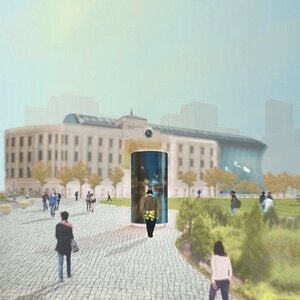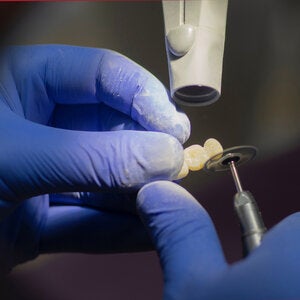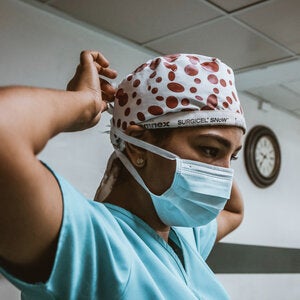Harvard’s graduate students are at the heart of the University’s teaching and research mission. Working at the intersection of disciplines, they make scientific discoveries that transform the way we live, uncover meaning in the arts and humanities, and educate future leaders. Their novel ideas and willingness to take risks draw the best faculty in the world to Harvard, who in turn attract more top students to work side by side with their mentors.
Donors have provided crucial philanthropic support for graduate fellowships across Harvard’s Schools, enabling the University to recruit the most promising scholars from around the world and offer them the freedom to pursue their ideas wherever they lead.
The Next Generation of Physicians
In 1969, after the assassination of Martin Luther King Jr., an initiative was established to advance diversity at Harvard Medical School (HMS) and the Harvard School of Dental Medicine (HSDM). Led by a group of faculty members inspired by the civil rights movement, the effort aimed to recruit and support students from under-represented groups. Beverly G. Coleman MD ’74 and Everod A. Coleman Jr. DMD ’73, MPH ’73 were among the first Black students enrolled in what would prove to be a transformative experience.
More than 50 years later, the Colemans have paid it forward with a gift to the REACH scholarship program, which provides need-based funding to a select group of incoming MD students who demonstrate Resilience, Excellence, Achievement, Compassion, and commitment to Helping under-resourced communities—providing supplemental scholarship funding to help students from disadvantaged backgrounds accept admissions offers from HMS.
“We want future graduates to know that the Black people who went before them believed in them enough to establish this fund. We want the history of Harvard to reflect that HMS took a stand for what is right—and we are extremely grateful.”
The results have been far-reaching. “Many of these students go back to their communities to practice medicine,” says Beverly, a radiologist who specializes in prenatal imaging. “When patients see someone who looks like them, they trust them more—and ultimately, they have been reported to fare better in recovering from their illnesses. Every patient who listens to me is a result of my education.”
Several other donors at all levels have also chosen to support medical students through REACH in FY20, including HMS faculty at the Harvard Medical Faculty Physicians Group at Beth Israel Deaconess Medical Center and the Department of Dermatology at Brigham and Women’s Hospital.
“We want future graduates to know that the Black people who went before them believed in them enough to establish this fund,” Beverly says. “We want the history of Harvard to reflect that HMS took a stand for what is right—and we are extremely grateful.”
Integrating Oral Health and Medicine
Bruce Donoff DMD ’67, MD ’73 stepped down as dean of HSDM in 2020 after nearly three decades in the role, leaving behind a legacy that includes opening a new research and education building, expanding the School’s international presence, and advocating for the integration of oral health and medicine to ensure improved outcomes for patients everywhere.
“The integration of dental and medical education in the first one to two years here is very different than most dental schools. And that was critical in 1867 when the School was formed; it was the first to have that relationship with a medical school and the first to offer the doctor of dental medicine (DMD) degree,” says Donoff, Walter C. Guralnick Distinguished Professor of Oral and Maxillofacial Surgery and Harvard University Distinguished Service Professor.
In 2015, Donoff launched the HSDM Initiative to Integrate Oral Health and Medicine, which convenes academics, students, and leaders from the business and health care communities to advance innovations around the integration of oral health and primary care—not only to improve quality of life, but also to reduce health care costs.
To honor Donoff, Gerard Moufflet helped establish the Donoff Scholars DMD Scholarship, which will support future generations of HSDM predoctoral students pursuing a joint Harvard graduate degree along with their DMD degree. “I learned a lot from Bruce, who really became a mentor to me in the oral health care space,” says Moufflet, a longtime member and chair of the HSDM Dean’s Advisory Board. “I had not been involved at all in dentistry from a professional standpoint, and he really opened my eyes to the challenges that providers as well as patients face.”
In addition to his own gift, Moufflet has worked to raise funds for the fellowship. “The scholarship will ultimately better equip leaders by giving them the opportunity to gain the knowledge and credibility to advance the cause of well-rounded, integrated care,” Moufflet notes. “It will enable dental students to grow beyond oral care and view the world from a broader perspective.”
Just as the DMD degree was foundational in combining dentistry with medicine, a program now emulated by more than 50 dental schools around the country, Donoff says that providing an option for dental students to pursue a second degree—whether in public health, medicine, economics, or other fields—will expand their impact in the world.
Advancing Remote Learning
Dedicated champions of the Harvard Graduate School of Design (GSD) for more than a decade, the Irving family has repeatedly invested in the School’s capacity—and that of its faculty and students—to make a real impact in the world.
In 2008, John K. F. Irving AB ’83, MBA ’89 and his sister, Anne Irving Oxley, endowed a professorship in landscape architecture to honor their father, John E. “Jack” Irving, an avid conservationist of ecological and cultural areas. In 2013, they honored him further with a gift that launched the School’s Grounded Visionaries Campaign—which sought to deepen and broaden the faculty’s intellectual reach, lower financial barriers to students, and support ambitious research.
Established as part of this gift, the Irving Innovation Fellowship has offered recipients a platform for continued work with the GSD beyond their time as students. This year, renewed support from the Irving family came at a critical time as the GSD pivoted to remote learning during the pandemic. Four graduating students were appointed as fellows, working over the summer with lecturer in architecture Lisa Haber-Thomson MArch ’09, PhD ’17 on the Innovations in Virtual Teaching Task Force to research and develop new approaches in virtual design pedagogy. The fellows will carry this work forward through the academic year, providing support for faculty in the implementation and further development of remote courses.
“This is a perfect example of the flexibility, ingenuity, and tenacity of the GSD community,” says Irving, whose generous support, along with that of his wife, Elizabeth, extends across Schools at Harvard. “It is important that the GSD does whatever it can to support its students, and we are honored to have these students known as the Irving Summer Fellows.”
Lessons in Leadership
Inspired by their own ties to the U.S. military and national defense, Robert D. Paulson MBA ’69, ExEd ’93 and Robin M. Paulson chose to establish an MBA fellowship at Harvard Business School (HBS) to provide educational opportunities for current and former U.S. service members. In addition to providing financial aid for military veterans now, the Paulsons will support more veterans in the future through a planned gift to HBS.
“We had been looking at veterans’ organizations, many of which are very specific in focus and geographically bounded, and we wanted to have a broader reach and more impact,” says Robert, a former U.S. Army lieutenant who served in the Systems Analysis office at the Pentagon and whose family military service extends back as far as the Revolutionary War.
Both of Robin’s parents served during World War II, her father as a major in the Army Signal Corps and her mother in Navy intelligence. Both are buried in Arlington National Cemetery.
Members of the armed forces—active duty and veterans—often face obstacles in pursuing higher education. “Many military students come to HBS with a family—sometimes with young kids, added expenses, and added responsibilities,” Robert explains. “And you can’t build up the kind of savings as a Marine lieutenant that you would need to pay for school.”
In addition to giving recipients the chance to earn their MBA, the Paulsons believe that the Paulson Fellows will add value to the HBS community. “Our veterans have a high sense of national service, honor, and integrity,” Robert says. “This is why it’s so important to have military veterans in the student mix. They don’t have to guess what it’s like to be a real leader.”
Promoting Scholarship and Service in Tunisia
Strengthening the connection between Harvard University and Tunisia has been a long-term objective for Hazem Ben-Gacem AB ’92.
In 2017, his support enabled the Center for Middle Eastern Studies (CMES) to open an office in Tunisia, the University’s first overseas endeavor of this type and its first formal presence in the Arab world. The Tunisia Office has hosted more than 100 graduate and undergraduate student trips as well as faculty members and graduate students conducting advanced research. An intellectual hub for scholars from Tunisia and other North African and Middle Eastern nations, the office provides students with a bridge to renowned Tunisian archival facilities, serving as an incubator for analysis of the evolving social and political movements in the region. This year, Ben-Gacem renewed his support for the office for another five years.
“My hope has been to establish an outpost where Harvard faculty and students would come to discover Tunisia—its history, language, culture, art, and people—and integrate this experience into their scholarship and education,” Ben-Gacem says.
In addition to providing the opportunity for scholars to study and research in Tunisia, through the Hazem Ben-Gacem Postdoctoral Fellowship Fund at CMES established in 2017, he has enabled early-career scholars in Tunisia working in the social sciences and humanities to come to Harvard to teach and conduct advanced research for one academic year.
More recently, with a gift to Harvard Kennedy School, Ben-Gacem created the Hamida Ben-Gacem Tunisia Graduate Fellowship Fund for applicants from Tunisia wishing to pursue a master in public administration (MPA) degree. The fellowship program honors Ben-Gacem’s father, Hamida Ben-Gacem MPA ’72, the first Tunisian graduate of HKS.
“It was a privilege to attend Harvard Kennedy School back in the 1970s, thanks to a benefactor at the time,” Hamida says. “My Kennedy School education enabled me to contribute to the public sector in Tunisia. I believe this new scholarship program will allow the next generation of Tunisians to contribute to their country in the future.” The fellowship supports mid-level executives in Tunisia’s public sector as well as those employed by NGOs and similar organizations who are working to shape government policies that benefit Tunisia and its citizens. Iheb Chalouate MPA ’22, one of this year’s Ben-Gacem Fellows, most recently worked at the World Bank on public sector management for the region of North Africa. “I believe HKS will allow me to build the necessary skill set in this field so that I can help bridge the inequality gap in my home country,” Chalouate says.
“My Kennedy School education enabled me to contribute to the public sector in Tunisia. I believe this new scholarship program will allow the next generation of Tunisians to contribute to their country in the future.”








